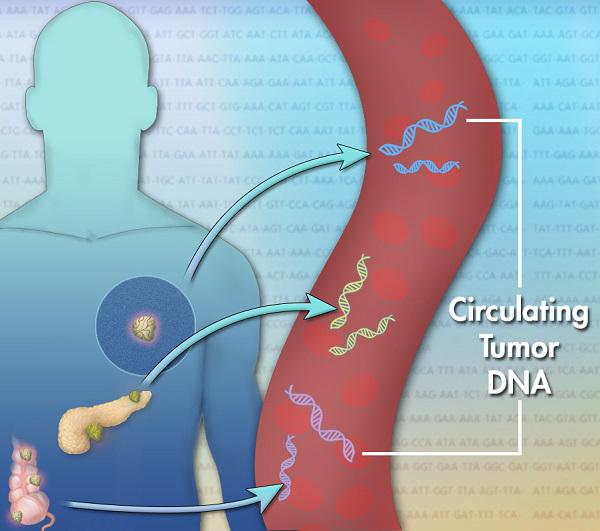Fast Facts:
- Colon cancer screening has been proven to save lives. But many people don’t get screened because they think the tests are unpleasant, inconvenient or embarrassing.
- Current guidelines say that everyone over the age of 45 should be screened for colon cancer. And at a younger age if you have risk factors like a family history or certain genetic syndromes.
- A new blood test called ctDNA (circulating tumor DNA) shows promise for being an accurate and convenient screening test that can be added onto routine blood tests.
- ctDNA can also be used to help decide whether chemotherapy is needed after surgery. It may help prevent unnecessary treatment or catch recurrent cancer earlier.
If you’ve been reading CheckIt4Andretti’s blog, you already know that colon cancer screening can save lives. You also probably know that gastroenterologists recommend getting screened starting at age 45. Many people mistakenly think that colon cancer screening is too inconvenient, embarrassing or unpleasant, so they just never get around to getting it done. But what if there was a safe, convenient, and accurate blood test that you could get along with your cholesterol test and blood counts? That kind of test could be available very soon. Let’s take a closer look at the ctDNA blood test for colon cancer.

What is ctDNA?
ctDNA is circulating tumor DNA. When normal cells or cancer cells die, small bits of their genetic material (DNA) gets loose in the circulatory system (blood stream). So ctDNA is tumor, or cancer, DNA that has gotten into the bloodstream. Because ctDNA is checking for tumor DNA in the blood, it’s sometimes called a “liquid biopsy.” ctDNA
How does the ctDNA test work?
Doctors have made a special test to tell the difference between normal DNA and cancer DNA. The test is as simple as having your blood drawn. The blood can be taken at the same time as your other lab tests during a routine doctor’s visit. For example, if you’re getting your blood count, cholesterol and electrolytes checked, the doctor will simply send part of the blood for the ctDNA test. The test looks for a specific pattern of DNA that only happens with colon cancer. If there’s any ctDNA present, a more thorough work-up needs to be done to find where it’s coming from. You should never have any ctDNA in your blood (not even a little!)
How good is the ctDNA test?
The ctDNA test for colon cancer is very good. Scientists look at how sensitive a test is. That means that if cancer is present, how likely is the test to pick it up? ctDNA has a 93% sensitivity compared to colonoscopy. Another thing scientists look for in a test is “specificity.” If you test negative (no ctDNA detected), it means you don’t have cancer. The ctDNA test has a 90% specificity.
ctDNA only picked up about 23% of precancerous lesions (advanced adenomas). Precancerous polyps can be readily seen by colonoscopy. Overall, ctDNA is as good as other stool-based screening tests. People find it more convenient, accessible and easier to complete than other tests. But colonoscopy is still the gold standard for colon cancer screening.
Is ctDNA readily available as a screening test?
Unfortunately, ctDNA is only available in a research setting. The good news is that researchers are working hard to make this test readily available. The ultimate goal is to improve colorectal screening. And since ctDNA is minimally invasive and convenient, it has the potential to make colorectal screening available to people who might otherwise shy away from other tests.
Are there other uses for ctDNA?
Yes! ctDNA can be used to prevent unnecessary treatment. Imagine finding out you have colon or rectal cancer. Your doctor will talk to you about surgery. And chemotherapy. And maybe radiation therapy.
Before starting chemotherapy, your doctor might decide to get a ctDNA test. Remember, a negative ctDNA test means that you have no detectable cancer. Based on a negative ctDNA test, you and your doctor might decide to hold off on chemotherapy. You may be able to get ctDNA blood tests every couple of months to make sure the test doesn’t turn positive. You’ve avoided unnecessary treatment!
And if you’ve had surgery and chemotherapy, ctDNA may be used to monitor for colon cancer recurrence in between colonoscopies. The earlier you catch colon cancer or colon cancer recurrence, the more likely you are to beat it.
Want to learn more about ctDNA testing?
If you want to learn more about ctDNA, watch this short video:
Colon cancer is the second most common cause of cancer death in the US. Screening tests should be done beginning at age 45. Catching colon cancer early with screening tests has been proven to save lives. But many people don’t get screened because the tests are inconvenient or unpleasant. ctDNA is a promising new test that is accurate, minimally invasive, easily accessible and convenient. ctDNA isn’t widely available yet, but research is ongoing and hopefully it will be very soon. No matter what test you decide to use, get checked for the people you love. CheckIt4Andretti!
Want to help wipe out colon cancer?
Donate to CheckIt4Andretti
Sign up for our newsletter
Take the Colon Cancer Risk Assessment
Follow our blog
0 Comments